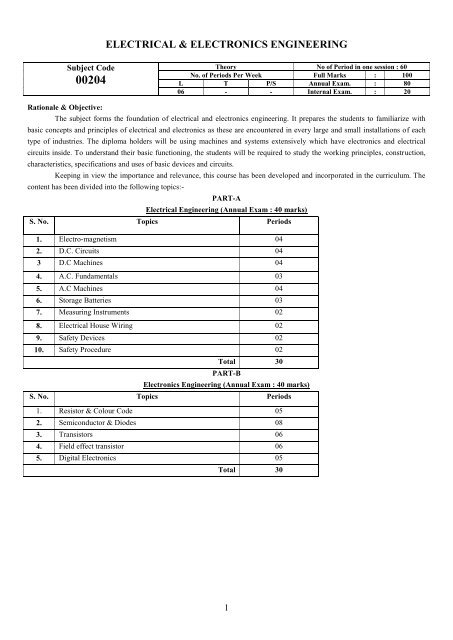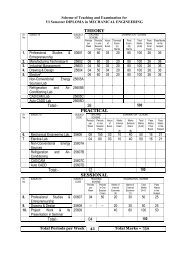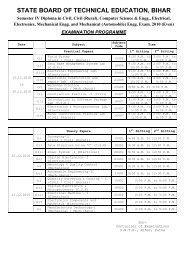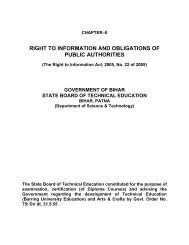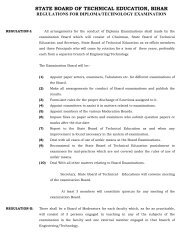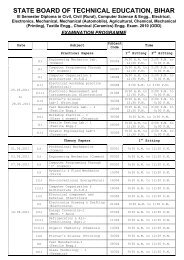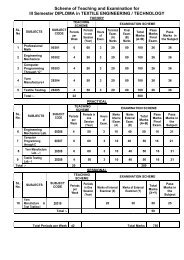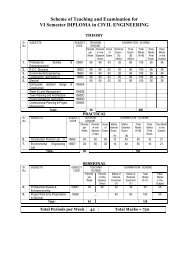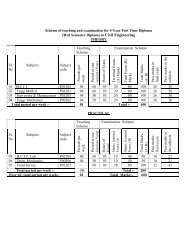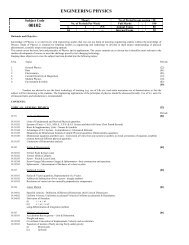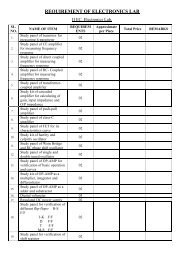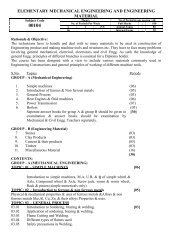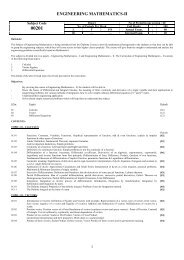Electrical & Electronics Engineering - SBTE Home Page
Electrical & Electronics Engineering - SBTE Home Page
Electrical & Electronics Engineering - SBTE Home Page
You also want an ePaper? Increase the reach of your titles
YUMPU automatically turns print PDFs into web optimized ePapers that Google loves.
ELECTRICAL & ELECTRONICS ENGINEERING<br />
Subject Code<br />
00204<br />
Theory No of Period in one session : 60<br />
No. of Periods Per Week Full Marks : 100<br />
L T P/S Annual Exam. : 80<br />
06 - - Internal Exam. : 20<br />
Rationale & Objective:<br />
The subject forms the foundation of electrical and electronics engineering. It prepares the students to familiarize with<br />
basic concepts and principles of electrical and electronics as these are encountered in every large and small installations of each<br />
type of industries. The diploma holders will be using machines and systems extensively which have electronics and electrical<br />
circuits inside. To understand their basic functioning, the students will be required to study the working principles, construction,<br />
characteristics, specifications and uses of basic devices and circuits.<br />
Keeping in view the importance and relevance, this course has been developed and incorporated in the curriculum. The<br />
content has been divided into the following topics:-<br />
PART-A<br />
<strong>Electrical</strong> <strong>Engineering</strong> (Annual Exam : 40 marks)<br />
S. No. Topics Periods<br />
1. Electro-magnetism 04<br />
2. D.C. Circuits 04<br />
3 D.C Machines 04<br />
4. A.C. Fundamentals 03<br />
5. A.C Machines 04<br />
6. Storage Batteries 03<br />
7. Measuring Instruments 02<br />
8. <strong>Electrical</strong> House Wiring 02<br />
9. Safety Devices 02<br />
10. Safety Procedure 02<br />
Total 30<br />
PART-B<br />
<strong>Electronics</strong> <strong>Engineering</strong> (Annual Exam : 40 marks)<br />
S. No. Topics Periods<br />
1. Resistor & Colour Code 05<br />
2. Semiconductor & Diodes 08<br />
3. Transistors 06<br />
4. Field effect transistor 06<br />
5. Digital <strong>Electronics</strong> 05<br />
Total 30<br />
1
Contents :<br />
PART-A<br />
<strong>Electrical</strong> <strong>Engineering</strong><br />
Topic 1. -Electro-Magnetism (04)<br />
01.01 Magnetic field due to current carrying straight conductor. Circuit loop and solenoid, Magnetic flux, Flux density<br />
01.02 Force between two current carrying parallel conductors.<br />
01.03 Magnetic circuit, seies and parallel, Reluctance. Analog between magnetic and electiric circuits.<br />
01.04 Faraday’s Laws of Electromagnetic induction. Lenz’s law. Fleming Right hand rule.<br />
01.05 Eddy current, its concept. Eddy current loss.<br />
01.06 Induce e.m.f. dynamically and statically induced e.m.f.<br />
01.07 Selft and mutual inductance.<br />
01.08 Energy storaged in a magnetic field.<br />
01.09 Related problems.<br />
Topic 02. -D. C. Circuits (04)<br />
02.01 Ohm's law and Laws of resistance. Concept of resistivity and conductivity, their units and dependence on temperature in<br />
a conductor.<br />
02.02 Kirchoff's Voltage and current laws and their application in simple circuits. (Simple idea only).<br />
02.03 Star-delta transformation.<br />
02.04 Thevenin’s theorem, Norton’s theorem, Super position theorem, Maximum power transfer theorem. (Simple idea<br />
only).<br />
02.05 Related problems.<br />
Topic 03. -D. C. Machines (04)<br />
03.01 D.C. Generator construction, principle, types.<br />
03.02 D.C.Motors- working principle, Type<br />
03.03 Starter- necessity and types.<br />
Topic 04. - A.C. Fundamentals (03)<br />
04.01 Concept of Alternating current and voltage. Difference between A.C. and D.C. concept of cycle, Frequency, period,<br />
amplitude, instantaneous value. Average value, I.M.S. value and peak value. Form factor, ( Definition only)<br />
04.02 Power in A.C. circuits and power factors. ( Basic idea only)<br />
04.03 Alternating voltage applied to pure resistance, pure inductance and pure capacitance. ( Simple idea only)<br />
04.04 Poly phase and 3 phase circuits. Concept of line voltage and current in 3 phse star and delta system.<br />
Topic 05. - A.C Machines (04)<br />
05.01 Transformer- principle construction.<br />
05.02 Transformer Ratio, efficiency and rating.<br />
05.03 Induction Motor- Principle, construction and types. ( Simple idea)<br />
05.04 Alternators- working principle. Brief idea.<br />
2
Topic 06. - Storage Batteries (03)<br />
06.01 Cell - Primary and Secondary Cell.<br />
06.02 Construction of Lead Acid battery ( Brief idea only)<br />
06.03 Methods of charging circuits on D.C. and A.C. Application.<br />
06.04 Maintenance of Battery.<br />
06.05 Study of Battery charges.<br />
Topic 07. –Measuring Instruments (02)<br />
07.01 Classification of Instuments.<br />
07.02 Watt Meter, Ammeter, Voltmeter, Frequency Meter and energy meter ( Simple idea only).<br />
Topic 08. –<strong>Electrical</strong> House Wiring (02)<br />
08.01 Switches, Socket and other itmes used in House wiring.<br />
08.02 Types of House wiring ( Brief idea only).<br />
Topic 09. –Safety devices (02)<br />
09.01 Fuse- Introduction, Use of fuse, Idea about relay and circuit breakes.<br />
Topic 10. –Safety Procedure (02)<br />
10.01 Effects of shocks and burns.<br />
10.02 Procedures to be adopted in case of electrical shocks.<br />
PART-B<br />
<strong>Electronics</strong><br />
Topic: 01 – Resistor & Colour Code [05]<br />
01.01 Definition, Introduction, connection of Resistors, Condenser,Colour Code, Value calculation of resistors<br />
through colour code.<br />
Topic: 02 - Semiconductor and Diodes [08]<br />
02.01 Conductors, Semiconductors, insulators, differences between them.<br />
02.02 Conduction in intrinsic and extrinsic semiconductors. Concept of electrons and holes, Donor and<br />
acceptor impurities. P and N type semiconductors and their conductivity, drift and diffusion currents.<br />
02.03 P-N Junction diode, Forward and Reverse bias, characteristics of P-N Junction and effect of<br />
Temperature, breakdown voltage.<br />
02.04 Introduction - Zener Diode ( Simple idea only)<br />
02.05 Photo diodes.<br />
02.06 Light Emitting diode.<br />
Topic: 03 – Transistors [06]<br />
03.01 Concept of Bipolar Transistor, PNP and NPN Transistors, Transistor action, Transistor configurations<br />
03.02 Transistor as an amplifier. Classification of Amplifiers, CB, CC and CE amplifiers.<br />
Topic: 04 - Field Effect Transistor [06]<br />
04.01 Introduction, Classification, its application ( Simple idea only)<br />
3
Topic: 05 - Digital <strong>Electronics</strong> [05]<br />
05.01 Number System, Binary number, Decimal number and Hexadecimal number, Conversion of each other.<br />
05.02<br />
05.03<br />
Basic idea about Gates.<br />
Introductory Concept of Memories.<br />
Recommended Books<br />
SL Title Author / Publisher<br />
1. <strong>Electrical</strong> Technology - B. L. Threja-S. Chand & Co.<br />
2. <strong>Electrical</strong> Technology - Edward Hyghes<br />
3. Basic <strong>Electrical</strong> <strong>Engineering</strong> - P.S. Dhogal-McGraw Hill Publisher<br />
4. Basic <strong>Electrical</strong> <strong>Engineering</strong> - J. B. Gupta-S. K. Kataria & Sons<br />
5. Basic Electricity - B. R. Sharma-Staya Prakashan, N. Delhi<br />
6. Electronic Principles - Malvino-Tata McGraw Hill<br />
7. <strong>Electronics</strong> & Radio <strong>Engineering</strong> - M. L. Gupta<br />
8. Basic <strong>Electronics</strong> - V.K. Mehta- S.Chand & Co. , New Delhi.<br />
9. <strong>Electronics</strong> Devices & Circuits - Millman & Halkias-McGraw Hill<br />
10. Basic <strong>Electronics</strong> & Linear Circuits - N. N. Bhargava & Kulshreshta-Tata McGraw Hills, New Delhi<br />
11. Basic <strong>Electronics</strong> - Grob-Tata McGraw Hill, New Delhi<br />
12. Digital <strong>Electronics</strong> and Application - Malvino Leach-McGraw Hills, New Delhi<br />
13. Introduction to Microprocessor - Dr. B. Ram, Fhanpat Ray & Sons<br />
4


